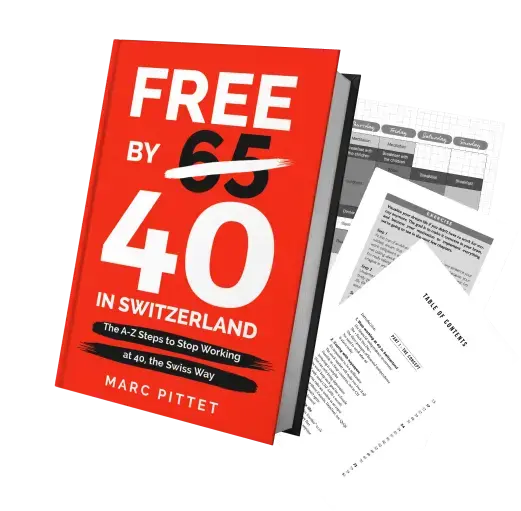In the last article of this series, I explained how we managed our money with expenses that were shared 50/50, like a fondue “moitié-moitié”.
Fast forward after a few years of common household. I finally got my first job with the salaries that went with it.
The beginning of our common financial life with pro-rated expenses
At that time, I was earning more than my SO. We’re newly married, and spent without really counting.
As we’re still sharing our expenses 50/50, Mrs. MP found herself with much less “Freedom” money (a budget category inspired by Jessie from YNAB with which everyone does what they want) than me.
We brought up the topic to decide of a common vision. Fortunately, we’ve always seen marriage as an alliance where equity is very important for the relationship to last in the long term.
So we decided to manage our budget by allocating each expense on a pro-rata basis to our salary so that none of us felt aggrieved about his/her savings.
In concrete terms, with a salary of CHF 6'000 for me, and CHF 4'000 for Mrs. MP (a total of CHF 10'000), I’d to pay 60% of any incoming invoice and Mrs. MP the remaining 40%.
In our relationship, I’m more the frugal one, and Mrs. MP is the “moderate” epicurean (by far not a compulsive spendthrift, fortunately!)
Before we used YNAB, Mrs. MP never had a budget. Or rather, she knew her monthly expenses, and regularly went on her e-banking to see how much she’d left and if she’d buy this or that.
This process had two main problems:
- Expenses weren’t instantly visible on her online banking system (especially a few years ago)
- It left little room for unexpected expenses - especially with our low salaries at the beginning of our respective careers
As a result, Mrs. MP regularly found herself at the end of the month doing back-of-the-envelope calculations to understand why she was overdrawn. Disbelief first, with a “But how is it possible that I still find myself in financial trouble…”.

These evenings spent doing back-of-the-envelope calculations...I don't miss them! (photo credits: ipr.northwestern.edu)
Then finding the unexpected invoice with a “Oh yes, I forgot to account for last nightclub outing…”, and the red of the account suddenly became explainable.
This was followed by the “Damn I work like crazy and I can’t indulge myself”, as well as the financial forecasting to come back afloat the following month.
The problem was that money management was only done month by month, so these “surprises” were coming back one or two quarters later.
Being more frugal by nature (probably because of my education, which I describe in a dedicated series), I’ve helped Mrs. MP several times by lending her money.
It was a benevolent feeling, but it only solved the problem temporarily. Because in the end it was just adding debt to it.
We’d sometimes get to “Geez, I don’t know how I’m going to pay you back, I’m so in the red zone already…”
In addition to her self-esteem, it also affected our relationship.
Despite these ups and downs, we’ve always managed to stay afloat without major debts nor financial problems (all this was always around a few hundred CHF).
Joint account
Regarding bank accounts, we switched to a joint account when we made made the move to pro rata. We also took the opportunity to reduce our bank fees by changing bank.
Each of us transferred our share to the joint account when we received our salary. This allowed us to set aside the necessary money for household expenses as a priority.
At the same time, we still had our personal accounts. It gave us a certain freedom (at least the illusion of it). But it also led to some situations that weren’t easy to manage because we lived a 100% common life at all levels, except financially.
An example: “Gosh, we didn’t plan this joint expenditure… we’ve to transfer money to the joint account… Ergh, you’re in the red zone this month? Don’t worry, we’re here to help each other. I’ll lend you some money. You can pay me back later. But you also have other unexpected personal expenses? Well OK it’s fine I’m gonna wait”.
This was followed by some hassling discussions “But how do you manage your budget?”
Then we found solutions. And compromises. The apprenticeship of money in a couple in summary :)
Another example: movie nights. Being closer to my budget (yeah, yeah, greedy if you want ^^), it was pretty regular that we’d small challenges like “Come on, let’s go to a restaurant afterwards, wouldn’t that be cool?”
As I’d the cash potentially, it was more difficult to say no compared to before where I didn’t have it.
It shows you the limit of the system of a pro-rata basis where, indeed, you keep your freedom, but it doesn’t lead to a common vision on the financial level in the couple.
Next step
After having passed this pro-rata and joint account milestone, we then moved on to a real budget. With the famous YNAB tool. It brought us a lot of transparency to understand where our difficulties came from at the end of each month, and also to better plan for unexpected expenses. I’ll explain all this in the next episode of this series.
If you’re in one of these phases now, or have already gone through it, I’d be interested to hear your feedback. And if you’re even more advanced than the MP couple, don’t hesitate to share your tips and tricks with us!





